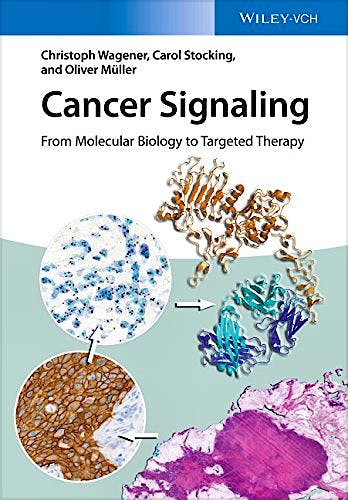

No hay productos en el carrito



Cancer Signaling. From Molecular Biology to Targeted Therapy
Wagener, C. — Stocking, C. — Muller, O.
1ª Edición Octubre 2016
Inglés
Tapa blanda
264 pags
768 gr
17 x 25 x 2 cm
ISBN 9783527336586
Editorial WILEY
LIBRO IMPRESO
-5%
79,30 €75,34 €IVA incluido
76,25 €72,44 €IVA no incluido
Recíbelo en un plazo de
2 - 3 semanas
Description
Cancer, which has become the second-most prevalent health issue globally, is essentially a malfunction of cell signaling. Understanding how the intricate signaling networks of cells and tissues allow cancer to thrive - and how they can be turned into potent weapons against it - is the key to managing cancer in the clinic and improving the outcome of cancer therapies. In their ground-breaking textbook, the authors provide a compelling story of how cancer works on the molecular level, and how targeted therapies using kinase inhibitors and other modulators of signaling pathways can contain and eventually cure it.
The first part of the book gives an introduction into the cell and molecular biology of cancer, focusing on the key mechanisms of cancer formation. The second part of the book introduces the main signaling transduction mechanisms responsible for carcinogenesis and compares their function in healthy versus cancer cells. In contrast to the complexity of its topic, the text is easy to read. 14 specially prepared teaching videos on key concepts and pathways in cancer signaling are available from a companion website.
Contents
The role of intracellular signaling pathways in cancer development (introduction)
The cellular view
The cell cycle
Apoptosis
Communication of tumor cells with the microenvironment
Vicious cycle in the generation of osteoclastic bone metastases in mammay cancer
The molecular view
Oncogenic receptor tyrosine kinase activation
Protein kinase C
The MAP Kinase (MAPK) signaling pathway
Molecular action of TP53 in carcinogenesis
The Wnt pathway in a normal and in a tumor cell
Effects of proteinases with metalloproteinase domains (MMPs, ADAMs) on tumor progression
BCR-ABL and the philadelphia chromosome
Oxygen sensing by Hypoxia inducible factor (HIF)
SRC kinThe role of intracellular signaling pathways in cancer development (introduction)
The cellular view
The cell cycle
Apoptosis
Communication of tumor cells with the microenvironment
Vicious cycle in the generation of osteoclastic bone metastases in mammay cancer
The molecular view
Oncogenic receptor tyrosine kinase activation
Protein kinase C
The MAP Kinase (MAPK) signaling pathway
Molecular action of TP53 in carcinogenesis
The Wnt pathway in a normal and in a tumor cell
Effects of proteinases with metalloproteinase domains (MMPs, ADAMs) on tumor progression
BCR-ABL and the philadelphia chromosome
Oxygen sensing by Hypoxia inducible factor (HIF)
SRC kinase and its substrates
Dysregulated signaling proteins as starting points for cancer therapy
- BCR-ABL
- Raf kinase
- Her2
- EGF receptor
ase and its substrates
Dysregulated signaling proteins as starting points for cancer therapy
- BCR-ABL
- Raf kinase
- Her2
- EGF receptor
Author Information
Professor Dr. Christoph Wagener
Christoph Wagener is Professor of Clinical Biochemistry. He is director of the Institute of Clinical Chemistry at the University Medical Center Hamburg-Eppendorf. His areas of research are the interaction of tumor cells with their microenvironment, and molecular approaches to tumor diagnosis. Professor Wagener has authored more than 100 original scientific publications, 15 scientific reviews and 13 book chapters. Together with Professor Müller, he publishes the text book 'Molekulare Onkologie' and the 'Onkoview Videos' to be viewed at YouTube. Book and videos received excellent reviews from readers and viewers.
Professor Dr. Oliver Müller
Oliver Müller is professor for Applied Life Sciences at the University for Applied Sciences Kaiserslautern, Germany. He holds academic degrees in both biochemistry and medicine and worked for several years as scientist and deputy director at an institute of the Max-Planck-society. His areas of research are the intracellular signal transduction and the proteins involved in carcinogenesis. Professor Müller is author of more than 80 original articles, 10 patents, 15 scientific reviews and 4 book chapters. His work was honoured by several science awards.
© 2026 Axón Librería S.L.
2.149.0